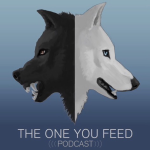I’ve been enjoying the podcast, The One You Feed, which is described as, “Conversations about creating a life worth living.” The episodes are either interviews with interesting and inspiring people or mini episodes, both of which offer advice and insight on how to live a more positive, constructive life. You can apply the topics and inspiration to your daily mindset, health and fitness, and/or work. After listening to several episodes, I started finding parallels in the stories to the work and life of an environmental professional.
The title, The One You Feed, is a reference to the parable of the two wolves that battle inside all of us. There is a bad wolf, representing greed, agner, envy, etc. and a good wolf representing joy, love, generosity, truth, etc. Which wolf wins the battle? The one you feed.
In my experience, environmental professionals work in this field because it feeds their good wolf. All of the professionals I’ve interviewed here have a passion for their work and get real satisfaction from it. Too many people don’t enjoy their work, job, or career. Environmental professionals more often than not do enjoy their work. We are driven by the science, the interesting work, and/or the overall goal of improving the environment of a work place, home, and/or the planet.
In an episode with James Clear, one of the key points presented is, “Reduce the scope and stick to the schedule.” I relate this to the environmental concept, “Think globally, act locally.” Working in the environmental field, you can get overwhelmed by the entirety of global climate change, it’s vast negative impacts, and the politicization of it. It can lead you to wonder if your small efforts are worth it.
Applying, “Reduce your scope and stick to the schedule“ works well here. Not all environmental professionals are working directly on climate change or sustainability, which are the two issues that make the news. But we’re all doing something in our own ways to improve the environment – clean air and water, renewable energy, reducing toxins, preserving wilderness, etc. Find your niche and take care of it. It can be managing a project to clean a small lake, reducing energy use, creating healthier workplaces, or designing sustainable buildings. Focus on your area, your steps, your schedule. It will become part of the larger scope.
That is only one example of the many stories I’ve listened to that have sparked my interest. I haven’t listened to every episode, but I like what I’ve gotten from it so far. I’d recommend it.

